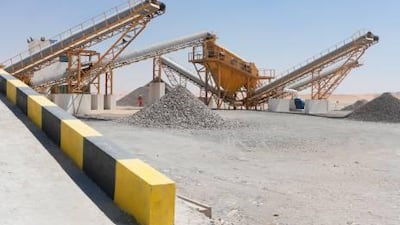AL AIN // The city's first facility for the recycling of waste material left over from construction and demolition work opened yesterday.
The recycling plant is capable of processing 2,000 tonnes of construction debris per day, turning that into usable materials such as the base used in road construction.
It is located by a new incinerator that aims to safely burn animal carcasses from farms in Sanayaa, a 40-minute drive from the centre of Al Ain. The dual facilities cost Dh82 million.
The plant is part of an ongoing effort to divert material from the emirate's landfill, said Majid al Mansouri, the managing director of the Centre for Waste Management - Abu Dhabi and chairman of the Department of Municipal Affairs.
The Centre for Waste Management opened a similar facility, capable of recycling construction and demolition waste, in Abu Dhabi last year.
The emirate of Abu Dhabi generates 4.7 million metric tonnes of waste per year, with construction and demolition activities the largest waste generators.
The emirate's landfills, which are already spread across 18 square kilometres, are projected to increase in size significantly if nothing is done to address the problem.
"This is part of our recycling strategy," Mr al Mansouri said. "Our plan is to only send 10 per cent of wastes to landfill, the rest will be recycled and reused."
Construction debris consists of large amounts of concrete, which can be crushed again into particles of varying size, depending on the use.
Re-using concrete in this way means less rocks need to be quarried from the mountains in Fujairah and Ras al Khaimah.
Although it has just opened, the recycling plant is already operating close to its full capacity, said SB Guru, the project manager at Star International Waste Management, which built the plant and operates it on behalf of the centre.
The plant can take concrete and mixed waste, which consists of concrete that is usually mixed with steel, plastics and wood. The mixed waste is processed through magnetic separators to remove the steel, then filtered and manually sorted to clear out any remaining debris.
Once the concrete has been cleared of impurities, it is crushed into several different sizes.
The end product is then sent for laboratory testing to make sure it meets technical requirements before it can be sold commercially, said Mr Guru.
He hopes the plant will have generated enough material to attract its first customers by the end of next month.
The recycling plant was opened in conjunction with a new incinerator, which the operators claim can safely burn animal carcasses from farms and other agricultural establishments.
The incinerator is capable of processing 1,200kg per hour.
Star International Waste Management is also in charge of operating Al Ain's landfill, collecting its medical waste and taking over its medical waste incinerator, which has been in operation since 2008.
Several other large waste-related projects will also move forward in the coming weeks, said Mr al Mansouri. After a delay of nearly two years, a previously announced plant to recycle used car tyres will be built in Al Ain by July, he said.
A new medical waste incinerator, specifically tasked with disposing of potentially dangerous waste, is planned in Abu Dhabi.
"We are now in contractual discussions," Mr al Mansouri said. "We should be signing the contract within one week."
Paolo Arribere, who manages Al Ain's medical waste incinerator, said one important consideration lay in managing the emissions. These include nitrogen oxide and sulphur dioxide, the same polluting gases that are released from car engines, as well as more dangerous substances such as heavy metals and dioxins.
"More than 60 per cent of the plant is made for treating these gases," he said.
At the Al Ain facility, the dangerous gases are cooled, treated with chemicals and filtered before they are released, Mr Arribere said.

